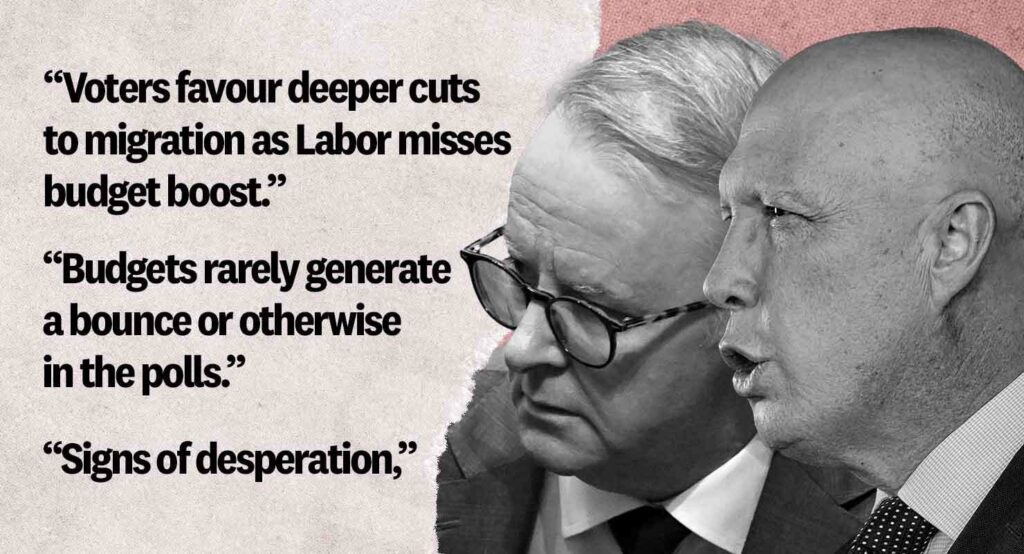Exclusive! Post-budget poll latest! Voters give bullshit two thumbs up! At least, that seems to be the take the Nine mastheads are urging out of the latest round of their proprietary Resolve national mood-testing on the Dutton thought bubble on restricting migration.
It’s a repeat of the editorial approach the company’s mastheads took last time around, with Dutton’s summertime meanderings on nuclear power: amplify with front-page reporting, dissect deep in a think piece, waive away questions with polling.
So it was this weekend. On Friday, headlines about Dutton’s apparent hard cap on permanent migration through an attack on international students; on Saturday, the weekly wrap, with a critique some 19 paragraphs in, following the admiring nod to the politically savvy “sleight of hand”; on Monday, “exclusive” polling: “Voters favour deeper cuts to migration as Labor misses budget boost.”
And so a political narrative is built on the foundations of a poll (just like the parallel Nine poll last December), matched with Dutton’s hard numbers that work to turn the right’s usual migration-sceptic logorrhoea into the solidity of, well, bullshit (in the strictly political science sense of the word.)
News Corp — itself a corporate migrator — had a harder job, with its post-budget Newspoll frustratingly showing both Labor and Albanese up on each of the four usual measures — primary vote, two-party preferred vote, preferred PM and personal approval.
The results were dangerously close to the actual election result last time around, threatening to puncture 18 months of hard work to shore up the narrative about a government in trouble. Albanese was rude enough to point out that, rhetoric aside, he’s never been behind on preferred PM. “Signs of desperation,” sniffed the Oz in reply.
The US company had to fall back on its poll of attitudes to the budget to get itself a headline. Like every report on the post-budget polls, it comes laden with caveats like this down in the 10th paragraph in the AFR: “Budgets rarely generate a bounce or otherwise in the polls.”
Still, they make news — in a professionally acceptable way. As Murray Goot wrote earlier this year, they emerged last century in tandem with “the rise of objectivity as an ideology” as a tool to allow journalists to report “consensually validated” claims about what the community thinks.
From 1941, when Sir Keith Murdoch’s Herald & Weekly Times first brought the Gallup Poll to Australia, the major public polls have been owned or commissioned by the large media corporations to punch out the collective wisdom of the Australian middle ground in an objectively, reportable, shape.
As news creations, polls measure opinion, not action. They tell us what people “think” — about migration, about nuclear power, about the budget — not what people will “do”. Most people hold their political values deeply, and their opinions (about events, about issues) surprisingly lightly.
Take the Nine poll on nuclear power earlier this year, which made news with its headline “Voters warm to nuclear as billionaire Andrew Forrest slams Coalition ‘bulldust’”. Opinion? About 36% supported nuclear power and a further 27% were open to the government investigating further. Values: Not in my backyard, as a suddenly cautious opposition continues putting off its promised reveal of locations.
For political parties, it’s the parts, not the whole, that matter: age, gender, region and pointers to how deeply — how vote-changing-ly — opinions may become.
The crosstabs in post-budget polls demonstrate the limits of opinion polling to validate consensus once politics crashes in. In Newspoll, Labor voters tick the budget (49% to 8%) while Coalition voters mark it down 16% to 38%). Forced to a choice, most people adapt their opinions to their party, as the shift in conservative support for the Voice demonstrated.
Created to serve the news cycle, media polls of opinion often end up measuring the very vibe they’ve created. Both Newspoll and the AFR poll find people reckon the budget will drive up inflation. Where could they have got that idea?
Media polls haven’t kept up with changing journalistic practice. Once, leaning into a neutral objectivity helped mass media to build and reflect in a broad middle ground. Now, the attention wars of social media reward the constant conflict framework of a fragmented media, and politics has fragmented with it.
In this world, polls still make news — but as weapons of political combat, not as builders of actionable consensus.
>>> Read full article>>>
Copyright for syndicated content belongs to the linked Source : Crikey – https://www.crikey.com.au/2024/05/22/media-polls-broken-news-machine/
